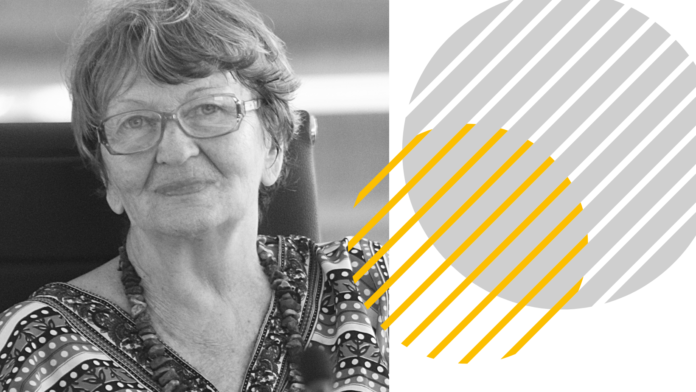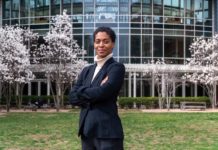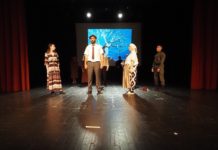Svenka Savić is a linguist and retired professor emerita at the University of Novi Sad, where she is one of the founders of the Center for Gender Studies within the Association of Centers for Interdisciplinary and Multidisciplinary Studies and Research (ACIMSI). At the University of California in Berkeley, where she spent the academic year 1979/1980 she listened to the lectures of many professors, including Robin Lakoff, whose copy of the book “Language and Women’s Place” she brought to students in Novi Sad. Savić connects her interest in the intertwining of language with gender, theology, and culture to the fact that her parents were not demanding when it came to education, so she did not have to learn about relationships and phenomena from books, but mostly from good examples and encouragement in the surrounding. Since I was born at the beginning of the Second World War as the third child in a family of an official, in the Vojvodina village of Gospodinci, in a time of poverty, fear, and everything that wartime implies, my preschool and early school years were riddled with anxiety. Certainly, at that time, life in the village was shaped somewhat according to the old and somewhat according to the new social arrangement. I went to church on Sundays even though my parents were not particularly religious, I read the Apostle during the divine service like other school children. Helping others was a basic educational principle that stemmed from the practice at home.
After moving to Novi Sad, Savić enrolled in a ballet school. Artistic expression made it easier for her to create her creed and map her educational direction. That was an important component – self-education through intuition – if you ask me about my place in society. We all know that the art of ballet in our country is predominantly female, I felt good in class and found my place there. The feminist layer may have stuck to that already established artistic one (‘the ballerina is in front, and the partner stands behind her’). The studies she attended at the Department of South Slavic Languages had nothing to do with feminism or theology, at least officially, she points out. But the Old Slavonic language course brought her back, at least linguistically, to religious questions.
When we talk about feminist and theological topics, I have to say that in my case, social events in our country, connected with events in my private life, were crucial for my professional growth. They determined the topics that I professionally dealt with within the language, in relation to other topics related to the language. In 1997, in collaboration with her colleagues, Savić founded “Women’s Studies and Research” as a recognized higher-education program which through its activities focused on the life stories of women from ethnic communities in Vojvodina, gender and language, feminist theology, and romology. In the early 1990s, when refugees from different parts of Yugoslavia arrived in Vojvodina, a group of enthusiasts registered the Ecumenical Humanitarian Organization (ECHO) in Novi Sad, which carried out projects intended to help refugees of different ages and genders (regardless of nationality or any other determination). I joined their work in the domain of language. So, together with Ana Bu from ECHO, I organized workshops with young people centered on religious understanding and tolerance, and we slowly came up with the idea of registering a non-governmental organization of women’s studies for personnel training of female students. Thus, we would continue to spread various knowledge about women and for women, among others, knowledge about religious issues in the theoretical (ideological) framework of ecumenism, always in an effort to build and ensure peace in the region.
From 2004 to 2007, Savić edited and hosted the show “Interfaith Dialogue” on Radio Marija in Novi Sad, during which over a hundred shows were broadcast with guests from various religious communities, as well as those who dealt with theology and science multidisciplinary. The participants in the program showed the listeners the practices of religious communities from various parts of the country and regions and the theoretical basis of ecumenical and peace ideas, through a historical perspective and in the present, to document the many angles of discussing the issue of dialogue between believers and dignitaries of numerous communities.
Through the structural analysis of the language and its use, how do you perceive modern society, especially regarding the correlation of language and gender?
This is the main question of feminist linguistics because there are great differences in the structures of world languages. Some languages (such as Hungarian or Finnish in Europe) do not know the category of gender as it is in our common language (grammatically: masculine, feminine, neuter), some have certain linguistic forms only for masculine and feminine gender. That is why there is no unequivocal answer as to how structure correlates with language use.
Linguistic typology (the study that deals with different language patterns) answers this complex correlation only partially. Typologists can be useful members of a group dealing with gender equality, just like Serbian or Croatian language scientists, but not the only ones who provide practical answers. The language usage is of equal interest to those in other scientific disciplines, in addition to linguistics, psychology, sociology, anthropology, ethnology, theology, and gerontology, but also the arts. Connecting the science of language with others is a possible way to answer the question. It was during my professional dealing with language that I explored those other professions to document the answer to equality as a complex process by using language, by no means simple and easily solvable, by no means solvable once and for all, and never truly finished. I am convinced that personal experience contributes a lot to understanding this complexity.
If we understand language as a deed, identity and cultural specificity that speakers embody by using it, what does this “say” about the differences in male and female use of the language?
If we focus on the languages that arose from the common language in our country, then we are not so much wondering about the structure itself, but about those who use that structure in shaping their statements (or text). The range of possibilities is wide and depends on the intention of the speaker. For example, when in parliament the chairman gives the floor to a member of parliament with the statement: Miss so-and-so has the floor, at first glance there is nothing discriminatory in the form of the statement, but the information that she is unmarried is a reason for them to belittle her in the parliament (in the sense: “she can’t even get married, and now she’s talking to us”). The form ”miss” is not suitable for use in the public sphere, because there are other forms by which a female person can be addressed or invited into dialogue in that situation (for example, by title or profession, etc.). In short, there is a variety of possibilities in a given situation, not just one possibility (in the sense of right or wrong).
For our practice to come alive, we educate various groups in the public and institutional sphere to reduce, neutralize, or reject speech/language which is today considered inappropriate for adequate social behavior and gender respect. Apart from the fact that I coauthored a book on the topic of gender and language, there is also a guidebook available for immediate practice in local communities.
You also questioned the power of language by analyzing (church) sermons. The sermon, through interpreting and explaining God’s word, has the characteristics of personal experience. Why is this interweaving of religion and language and linguistics and religion important?
This is an important topic in the framework of feminist theology that captures the attention of (not only) women in different (Christian) religions since God’s word is as much in the domain of language science as it is of theology. The priest’s sermon is based on the text from the Bible and has a special persuasive power with which priests shape the religious experience. It has a binding power for believers (today, more women are present in churches). Based on how the priest interprets certain parts of the holy texts (the Bible or the Qur’an) related to women, the result will be seen in their actions.
At the beginning of 1992, I was in a car crash with the priest and biblical scholar Dr. Tadej Vojnović in Novi Sad in the street where the Franciscan monastery is located. I was rushing home from the Faculty of Philosophy, where a friend who was looking after my younger daughter was waiting for me, and Vojnović was driving one person home after mass. From the outside, this was a collision of different perspectives. However, only my “peglica” (Fiat 126) suffered damage, and I gained immeasurable excitement in my life to this day. Tadej introduced himself as a priest and as a biblical scholar, in such a way that it immediately ‘turned on the light’ in my soul and I offered him to speak at our Faculty as part of the series of lectures (co-organized by Dubravka Valić Nedeljković, Veronika Mitro and I, on Wednesdays at noon, entitled “Psycholinguistic Colloquiums”). For the first time, a member of the clergy spoke about the Bible at the Faculty. Then we invited both men and women from other religious communities. It was a significant step to hear the voices of people from theology among young people in the academic surroundings in that turbulent time full of challenges. Our collaboration on sermons was born from this. On Monday evenings, Tadej held Bible meetings in the Franciscan monastery, where, in addition to the believers, many young people from various colleges came. There they acquired knowledge about the basic values of the sacred texts and how to interpret them for the needs of today’s (then’s) crises.
So, my dealing with feminist linguistics and the analysis of sermons in the Catholic Church was not planned, nor based on my education, but the situation dictated that I make an effort and master the knowledge of religion I lacked. I recorded a large number of not only Tadej’s sermons in the Catholic Church but also the sermons of Orthodox and several Protestant priests, analyzed them, and noticed places where interpretations differ using my knowledge in linguistics and feminism (but also my own experience). Unfortunately, in our country, feminist theology has not fulfilled the duty that could be its privilege in practice.
Based on your personal experience how does feminism interact with religion?
In religion, we talk about a mission – each of us has a duty in life, something that we need to do because this was installed on us. In feminism, we talk about activism or the actions that we need to do to make the world better. Hence feminism and religion can be united very easily. Many associate feminism only with atheism, which is only part of the overall picture. Many female theologians (even male theologians) are feminists sensitive to open issues in society (people without homes, ecology, and other topics). It is not good that the word feminism still triggers negative thoughts and attitudes in some people (those associated with the church). I decided to fight through my profession. Feminism must be practical, the personal knowledge must become general.
The conference on feminist theology that you organized in 1999 was certainly a pioneering endeavor in that field. What motivated you to organize that gathering and what memories do you have on interreligious women’s activities?
Just to remind ourselves that this was a period of turbulent events in our region, and peace was the basic theme that we wanted to affirm through various forms of work ‘in the field’. One of those was the ecumenical gatherings for peace organized by ECHO (once a week each time in a different church). It turned out that Protestant priestesses performed important peace work during those complex times, each of them took care of refugees in their community, and the general public did not know enough about it. It was the collection of papers from that conference that showed that in Serbia and the region, women in Christian religions work towards a common goal, building peace and that the general public is not aware of it. Protestant priests from the Evangelical Methodist Church like Ana Palik Kunčak showed us the strength of their work, then women from the Reformed Christian Church, and so on. With the conference, we wanted to affirm the potential of women in various religions and make it visible.
The cooperation was (and remains) to the mutual satisfaction. We opened up topics that have already been discussed in theology – the question of the place and position of women in religions. Since then, I have been researching new forms of public actions, how religious media present women, especially in the context of Orthodoxy, gathering data that are not very favorable. I started working with Zilka Spahić Šiljak from Sarajevo (who defended her doctoral dissertation at the University of Novi Sad). Zilka was the thread connecting us with what women do in Islam. So, over the years, we have built a successful cooperation, she in Bosnia and Herzegovina, Jadranka Rebeka Anić in Croatia, and I in Serbia.
What is important in fostering understanding, mutual trust, and cooperation between theologians in the Serbian Orthodox Church and feminists in Serbia?
If we are Christians, we should understand the basis of why we are here. If we are women, we should have a basis for mutual understanding because we are everywhere placed second (in everyday life and the profession). When discussing cooperation, there are more obstacles related to prejudices about feminists and feminism by some Orthodox theologians (not only in Serbia), although not all. That is why dialogue is important: public and institutional, but especially at the individual level. There is hope because the fact is that the situation differs among the Orthodox dioceses in Serbia (since their activity is not centralized like in the Catholic Church), so we already cooperate nicely with some of them.
In the proceedings of Feminist Theology, you analyzed the conversation between Jesus and the woman from Samaria, where you state that she is a mediator, his disciple, and represents precisely the sign of the faith of the “others”. What is the role of feminist theology in the context of “otherness”?
Using examples from dogmatic texts, I showed God’s attitude towards women – the dialogue of Jesus Christ with the Samaritan woman (Gospel of John), from which it can be seen that he approaches the woman with a lot of love and respect, drawing out from her soul the most beautiful things that she carries – faith and love for others. Another example is the meeting between Mary and the angel (Gospel of Luke), from which I analyze Mary’s consent to cooperate with God. The third example is the meeting of Jesus with Martha and Mary (Gospel of Luke) which instructs us that sisters should cooperate. In all three examples from the New Testament interpreted from a feminist perspective, we show how they are interpreted in the church by priests, to show the difference of the feminist perspective.
Otherness can also be seen through the challenges faced by people with disability, but also by those of other ethnic communities, then refugees who are new to our ”space“ There are many examples. As I pointed out in one of my articles, we as Christians are called to oppose every form of violence, concerning the planet, others around us, and ourselves. The fight against violence in the 21st century is equally the task of all of us, especially against domestic violence, and the voice of women, although strong, is poorly listened to even today. If we still keep silent and do not show signs of resistance to all forms of violence – are we still believers?
Do you consider feminist theology to have a consistent and sufficient voice today?
Not in our county. It should be louder. This interdisciplinary requires a lot of knowledge, but also goodwill, to exchange knowledge among diverse groups of women and men. This is precisely why I have given numerous lectures in this field in various organizations, not only women’s, which have women’s studies, such as Belgrade, Novi Sad, Niš, Kotor, Sarajevo, and elsewhere. Feminism does not reside in the offices of female scientists, nor does theology disappear there. Both science and theology are present among people, in exchange with others. If we understand knowledge in this way, then I can say that I have achieved to demonstrated it in many ways, even though it is not my primary professional discipline – in numerous public lectures in various cities of the region, in various media, for the longest time on Radio Marija. Ultimately, we held three large international meetings and published three books after those.
The publication of this text was supported by the Electronic Media Agency as part of the program to encourage journalistic excellence












